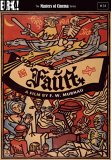![Munchhausen [1943]](/pictures/1002305.jpg) Munchhausen | DVD | (18/08/2003)
from £18.92
| Saving you £2.33 (13.19%)
| RRP
Munchhausen | DVD | (18/08/2003)
from £18.92
| Saving you £2.33 (13.19%)
| RRP Enjoying the dubious billing of being the Third Reich's "finest fictional moment", Münchhausen lives up to the hype. Commissioned by propaganda minister Joseph Goebbels to mark the 25th anniversary of the UFA film studio in 1943, director Josef von Baky was given every incentive artistic, technical and financial to create a state-of-the-art film outflanking Hollywood--and, in most respects, he succeeded. Hans Albers is understatedly right as the buccaneer aristocrat, his adventures over the centuries made possible by preternatural longevity. Hermann Speelmans gives sterling support as loyal manservant Kuchenreutter, while Brigitte Horney has appealing decadence as Catherine the Great. The spectacular Venice canal sequence and whimsical moon episode are balanced by strong scriptwriting from "Berthold Bürger" (Erich Kästner of Emil and the Detectives fame), with Georg Haentzschel's lushly eclectic score scarcely inferior to those by his more famous Hollywood counterparts. A tendency to send-up non-German nationalities hints at Nazi ideology, but otherwise this is pure--though never soulless--escapism, produced to the highest artistic standards. On the DVD: Münchhausen on disc is presented in a restored print which recaptures the original's breathtaking interplay of colour, and the soundtrack has been very adequately cleaned up. Just eight access points and subtitles in English only, but a photo gallery of over 100 stills and memorabilia to chart the course of the film in detail. R Dixon Smith's insightful documentary feature gives the lowdown on why the film was made. All the more remarkable, then, that it's survived the vicissitudes of its era so handsomely. --Richard Whitehouse
 Faust | DVD | (26/06/2006)
from £N/A
| Saving you £N/A (N/A%)
| RRP
Faust | DVD | (26/06/2006)
from £N/A
| Saving you £N/A (N/A%)
| RRP Murnau's last German film features astonishing photography magnificent art direction and special effects which retain the power to amaze. Freed from the constraints of psychological narrative Murnau's mastery of cinematic technique places Faust at the pinnacle of the silent era its barrage of visceral and apocryphal imagery contrasting with the simplicity and directness of its spiritual theme. Faust's tale is a classic one of a man who sells his soul to the devil. In an attempt
![Faust [1926]](/pictures/1012911.jpg) Faust | DVD | (21/01/2002)
from £20.00
| Saving you £-0.01 (N/A%)
| RRP
Faust | DVD | (21/01/2002)
from £20.00
| Saving you £-0.01 (N/A%)
| RRP Shot in the UFA studios with a big movie star in the lead and all the special effects and production design resources any blockbuster of its time could wish for, FW Murnau's 1926 Faust represents a step up from his better-known Nosferatu. Oddly, Faust is a less familiar film than the vampire quickie and this release affords fans a chance to see what Murnau can do with an equally major fantasy story. Adapted neither from Marlowe's play Dr Faustus nor Goethe's verse drama, the script scrambles various elements of the legend and presents a Faust (Gosta Ekman) driven to summon the Devil by despair as a plague rages through the town, desperate to gain enough learning to help his neighbours. When this deal doesn't quite work out, because he is stoned by townsfolk who notice his sudden fear of the cross, Mephisto (Emil Jannings) offers Faust instead renewed youth and an opportunity to seduce a famously beautiful Italian noblewoman and then to return to his home village and get involved with the pure Gretchen (Camilla Horn). Like most versions of the story, it's episodic and some sections are stronger than others: the great stuff comes in the plague and initial deal sequences, though it picks up again for the tragic climax as Gretchen becomes the central figure and suffers horribly, freezing in the snows and burning at the stake. Jannings' devil, a gruesomely humorous slice of ham, is one of the great silent monster performances, reducing everyone else to a stick figure, and Murnau faces the challenge of topping his Nosferatu imagery by deploying a battalion of effects techniques to depict the many magical journeys, sudden appearances and transformations. On the DVD: Often seen in ragged, incomplete prints projected at the wrong speed, this is a decently restored version, running a full 115 minutes with a complete orchestral score. The original materials show some of the damage to be expected in a film of its vintage, but the transfer is excellent, displaying the imaginative art direction and camerawork to superb advantage. Aside from a nicely eerie menu, the sole extra is a full-length commentary originating in Australia: written by historian Peter Spooner but read by narrator Russell Cawthorne (who mispronounces the odd name). This provides an interesting wealth of background detail, such as Murnau's attempt to cast Hollywood's Lillian Gish as Gretchen, and delivers a balanced assessment of the film itself. --Kim Newman

Please wait. Loading...
This site uses cookies.
More details in our privacy policy